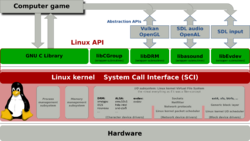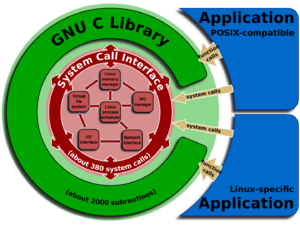Hybris
Topic: Software
 From HandWiki - Reading time: 5 min
From HandWiki - Reading time: 5 min
| Original author(s) | Carsten Munk |
|---|---|
| Developer(s) | Mer, Jolla, Open webOS community, Canonical Ltd. |
| Initial release | 5 August 2012[1] |
| Written in | C, C++ |
| Operating system | Linux |
| Type | Compatibility layer |
| License | Apache License 2[2] |
| Website | github |



Hybris or libhybris is a compatibility layer for computers running Linux distributions based on the GNU C library or Musl,[3] intended for using software written for Bionic-based Linux systems, which mainly includes Android libraries and device drivers.[4]
History
Hybris was initially written by Carsten Munk, a Mer developer, who released it on GitHub on 5 August 2012[1] and publicly announced the project later that month.[4][5] Munk has since been hired by Jolla as their Chief Research Engineer.[6]
Hybris has also been picked up by the Open webOS community for WebOS Ports,[7][8] by Canonical for Ubuntu Touch[6][9] and by the AsteroidOS[10] project.
In April 2013, Munk announced that Hybris has been extended to allow Wayland compositors to use graphic device drivers written for Android.[6][11][12] Weston has had support for libhybris since version 1.3, which was released on 11 October 2013.[13]
Features
Hybris loads "Android libraries, and overrides some symbols from bionic with glibc"[4] calls, making it possible to use Bionic-based software, such as binary-only Android drivers, on glibc-based Linux distributions.
Hybris can also translate Android's EGL calls into Wayland EGL calls, allowing Android graphic drivers to be used on Wayland-based systems. This feature was initially developed by Collabora's Pekka Paalanen for his Android port of Wayland.[6][14][15][16]
See also
References
- ↑ 1.0 1.1 "Initial commit of stskeeps/libhybris". GitHub. 2012-08-05. https://github.com/stskeeps/libhybris/tree/61be806ee72f3b3df8bdd31256e082d2e92dab49.
- ↑ "libhybris/hybris/COPYING". GitHub. 2013-04-04. https://github.com/libhybris/libhybris/blob/master/hybris/COPYING.
- ↑ "Hybris - postmarketOS". https://wiki.postmarketos.org/wiki/Hybris#What_is_libhybris.3F.
- ↑ 4.0 4.1 4.2 Carsten Munk. "So, introducing libhybris,…". Google+. https://plus.google.com/113386402913695079840/posts/9LF6atjc455.
- ↑ "Libhybris: Load Android Libraries, Override Bionic Symbols". Phoronix. 2012-09-25. https://www.phoronix.com/scan.php?page=news_item&px=MTE5Mjk.
- ↑ 6.0 6.1 6.2 6.3 Carsten Munk (2013-04-11). "Wayland utilizing Android GPU drivers on glibc based systems, Part 1". Mer Project. http://mer-project.blogspot.com/2013/04/wayland-utilizing-android-gpu-drivers.html.
- ↑ "Open webOS ported to Nexus 7 over holiday break". The H Open. 2013-01-07. http://www.h-online.com/open/news/item/Open-webOS-ported-to-Nexus-7-over-holiday-break-1778794.html.
- ↑ "WebOS-Ports". WebOS-Ports. http://webos-ports.org/index.php?title=Main_Page&oldid=3933#Breaking_News.
- ↑ "libhybris in Launchpad". Launchpad.net. 2013-02-05. https://launchpad.net/libhybris.
- ↑ "AsteroidOS: An open-source operating system for smartwatches". AsteroidOS. http://asteroidos.org/.
- ↑ Munk, Carsten (2013-05-08). "Wayland utilizing Android GPU drivers on glibc based systems, Part 2". Mer Project. http://mer-project.blogspot.com/2013/05/wayland-utilizing-android-gpu-drivers.html.
- ↑ "Jolla Brings Wayland Atop Android GPU Drivers". Phoronix. 2013-04-11. https://www.phoronix.com/scan.php?page=news_item&px=MTM0OTE.
- ↑ "Wayland and Weston 1.3 release notes". 2013-10-11. http://lists.freedesktop.org/archives/wayland-devel/2013-October/011419.html.
- ↑ Munk, Carsten (2013-04-13). "libhybris/hybris/egl/platforms/common/wayland-android.xml". GitHub. https://github.com/libhybris/libhybris/blob/8e79ef1c72ab768496779d7264375c3301b7b364/hybris/egl/platforms/common/wayland-android.xml.
- ↑ "First Signs Of Wayland Running On Android". Phoronix. 2012-04-27. https://www.phoronix.com/scan.php?page=news_item&px=MTA5MzA.
- ↑ Pekka Paalanen (2012-09-24). "Wayland on Android: upgrade to 4.0.4 and new build integration". http://ppaalanen.blogspot.com/2012/09/wayland-on-android-upgrade-to-404-and.html.
External links
 KSF
KSF